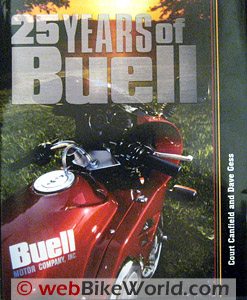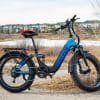I’ve always carried a soft spot in my heart for Buell Motorcycles, but I’ve never owned one.
The concept of modifying a classic Harley V-Twin engine to power a modern Sportbike makes perfect sense to me.
It’s a way to theoretically expand the market beyond the traditional use of that powerplant.
Also, rooting for the underdog is an American tradition, and if Buell ain’t an underdog, I don’t know what is.
I’m partial to the type.
That is, motorcycles like Aprilia, Moto Guzzi, MV Agusta, MuZ — along with Buell — are the rare gems for the rest of us, the riders who want to be different in a country where 8 out of 10 motorcycles are said to be cruisers.
But honestly, I’m surprised Buell is still around, especially after reading this new book, written by two former Buell associates who have been affiliated with the company since the beginning.
Erik Buell — and his namesake company — had many close scrapes over the years, and knowing how hard it is to get a motorcycle brand established today, it’s actually pretty amazing that Buell is still kicking.
The biggest question remains unanswered though — what in the world does Harley-Davidson get out of the relationship with Buell I’m surprised that the book doesn’t address this.
Harley-Davidson has phenomenal marketing prowess, but my feeling is they’ve blown it time and time again with the Buell connection.
There could have/should have been so much made of this by now, after 25 years of Buell, and the brand remains on continuous life support as far as I can tell.
For example, the local Harley/Buell dealers near my home seem to have zero interest in actually selling anyone a Buell motorcycle.
In fact, it’s been about 6 years by my count since one of the biggest dealers around even featured a Buell on their showroom floor!
Not much of this is addressed in 25 Years of Buell, which I think is too bad, and may be an indication that the people who wrote the book might just be a little too close to the Buell/HD family to really tell it like it is.
There is, however, a little too much Buell hero worship in the first chapter, which bothered me some.
But overall, the book is an interesting read and, I think, it clears up some of the myth that surrounds the brand.
One thing’s for sure: Erik Buell is as passionate and committed as anyone in the motorcycle industry, and after reading the book, it’s obvious to me that what success they’ve had so far has a lot to do with the force of his personality.
The authors relate some interesting stories about the start of the company, with anecdotes about Buell’s racing career and how it led to the creation of the company, almost by stringing together one improbable project with the next.
Buell Motorcycles is nothing if not innovative.
And I didn’t realize how advanced some of Erik Buell’s early designs really were, like the RR 1000 and RR 1200 “Battle Twin”, originally built for racing and which also has many land speed records from Bonneville.
Buell first entered my consciousness with the fantastic-looking S1, which I think was way ahead of its day and to me is still one of the best-looking Buells.
The S2 Thunderbolt always seemed rather clunky, but the more recent XB9R Firebolt, the XB9S Lightning and the very new water-cooled 1125CR “21st Century Cafe Racer” have been growing on me also.
By the way, I distinctly recall reading about Erik Buell once saying that he’d never have a water-cooled engine in one of his bikes — which I thought was a dumb statement at the time, so I won’t hold him to it!
The book doesn’t address the future of Buell, either with fact or conjecture, which is also too bad.
I’m not sure Buell is headed, and the market for the “bare knuckle brawler” streetbike style must be at the saturation point. Will we see “real” sport-tourers, or how about some type of half-Harley/half-Buell futuristic-retro take on, say, the V-Max?
Where they’re going with the Ulysses is also beyond me; of all the things to do, the adventure-touring concept just doesn’t seem to fit with the Buell image.
25 Years of Buell has some nice color photographs and a short summary at the end covering the newer models.
I learned a lot about Buell history, but I still get the feeling that there’s probably more to tell than this particular pair of authors is letting on.
It will be interesting to see where the company goes.
Also, if the bikes and the quality will improve and most important, what Harley-Davidson will do now that their sales have stalled.
Hopefully they will wake up to the fact that there’s a gem of a company right there under their nose that has the potential to be much more than a niche player in the international motorcycle scene.
Publication Date: July 2008


Owner Comments and Feedback
See details on submitting comments.



